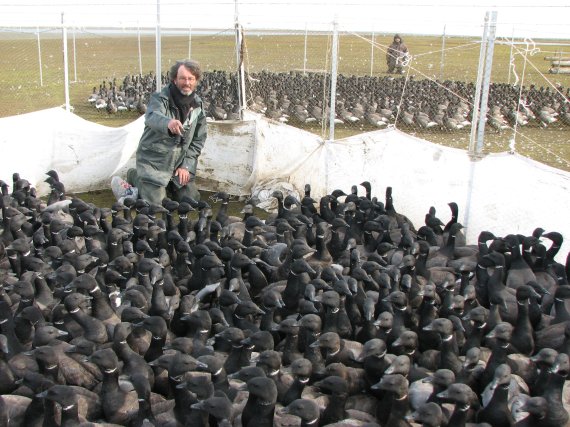The launch party for The Brent Goose (written in Dutch) was held at his publisher’s offices in Amsterdam on 7 April. The book draws on four decades of study.
The book is written in the I form. Why?
‘That was a deliberate choice on the part of the publisher. I didn’t find it all that easy; I prefer to stay in the background. As a scientist you are trained to be objective and to maintain your distance. But scientific publications are often unreadable, thanks in part to all their statistics. With this book, I am aiming at a wide public. That is the teacher in me.’
What is so special about the brent goose?
‘My doctoral research topic was the ecology of the barnacle goose. Afterwards, I joined the RIN [predecessor of Alterra, ed.]. My first assignment was the brent goose, which farmers on Terschelling were finding increasingly troublesome. One thing led to another. So to some extent I’ve studied the brent goose by chance. But it is also question of seizing an opportunity when it presents itself.’
What is your greatest contribution to our knowledge of the brent goose?
‘In the first place that the healthy condition they develop here in the spring in the Wadden region is vital to their breeding success 5000 kilometres away in Siberia. Another major discovery is that their breeding success coincides with the three-yearly cycle of the lemming. When lemmings are abundant, the brent goose also thrives. Thanks to my research we now know how the interaction works between snowy owls, arctic foxes and pomarine skuas in a lemming peak year and how that benefits brent geese and waders.’
Geese have become a pest in our country. Where do you stand on the issue of hunting geese?
‘I’m no hunter, but neither am I opposed to hunting. If I’m given a goose, I’ll enjoy eating it. If there’s enough of something, I don’t mind if you harvest it. I find that a much more appealing stance than seeing geese as a pest that must be controlled. Hunting is an important factor in how we regulate numbers. I’d go even further and say that the goose has become so successful here in the Netherlands because at some time in the past hunting restrictions were imposed. There is an essential difference between animal conservation and nature conservation. Animal conservation is all about the individual, nature conservation is all about the population. Many people don’t appreciate the difference. Hunters and nature conservationists actually share the same aim: to make sure there are lots of geese. Only for different reasons.’
De rotgans, paperback, 368 pp., ISBN 9789045091600, published by Atlas Contact.

